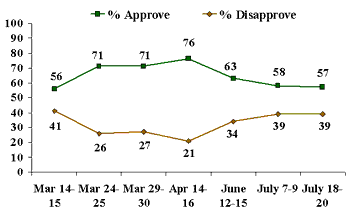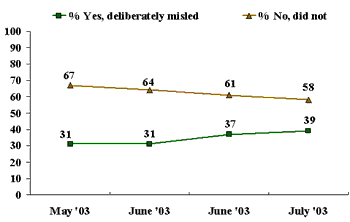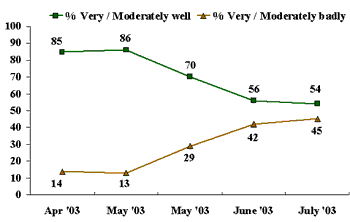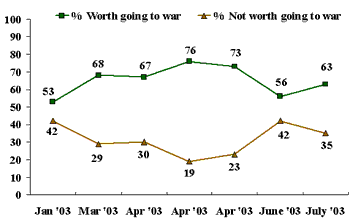GALLUP NEWS SERVICE
PRINCETON, NJ -- There's been relatively little movement in public attitudes about Iraq over the last several weeks, based on polling conducted prior to Tuesday's announcement that Saddam Hussein's two sons Qusay and Uday had been killed by U.S. troops in Mosul, Iraq.
Most indicators of the public mood on Iraq are significantly more negative than they were at the height of the war, or in the weeks that followed it. But there has been little evidence of further deterioration in these attitudes in recent weeks. Americans recognize that things are not going particularly well in Iraq, but a majority say that the situation in Iraq was worth going to war over, that the current military presence there is worth it, and that President Bush did not deliberately mislead the American public before the war in his statements about weapons of mass destruction.
President Bush and Iraq
Much attention has been focused on President George W. Bush's problems relating to Iraq, including the controversy over the origins of the now famous statement included in Bush's State of the Union Address about Iraq's possession of uranium from Africa.
But recent Gallup polling data indicate that many Americans are not as concerned about this and other aspects of the Iraqi situation as media coverage might suggest. Gallup's latest assessment of the public's views of the most important problem facing the country, completed July 7-9, shows that concerns about the economy are much more prevalent than concerns about war or Iraq. Perhaps as a result, the polling finds that public views of the Iraqi situation and how Bush has handled it have remained relatively stable over the last few weeks, even in the face of the heightened news coverage.
Bush's job approval rating on Iraq is 57%, almost the same as the 58% Gallup measured earlier in July. That's also similar to his job approval rating on Iraq earlier this year, prior to the beginning of the war. (During the war, Bush's approval rating on Iraq soared to a high point of 76%.)
| George W. Bush's Job of Handling Iraq Situation |
 |
The current 57% level of approval on Iraq is 2 points below Bush's overall approval rating, slightly higher than his approval rating on foreign affairs, and 12 points higher than his rating on handling the economy.
There has been a considerable amount of polling dealing with the issue of what Bush knew or didn't know about uranium and weapons of mass destruction in the months leading up to the war. In general, the results show that many Americans assume Bush exaggerated or provided inaccurate information about Iraq's possession of weapons of mass destruction -- but less than a majority believe that Bush lied or deliberately misled the public.
Fifty percent of those in a recent ABC/Washington Post poll say that the Bush administration "intentionally exaggerated its evidence that Iraq had weapons of mass destruction, such as biological or chemical weapons." A CBS news poll found 56% agreeing that the Bush administration overestimated the number of weapons of mass destruction in Iraq.
But the CNN/USA Today/Gallup poll asked if the Bush administration " … deliberately misled the American public about whether Iraq has weapons of mass destruction, or not," and the results show less than majority agreement. The latest read on this measure, obtained in Gallup's July 18-20 poll, indicates that 39% of Americans say Bush intentionally misled the American public. That's just 2 points above the results of a late June poll, and can be compared to the 31% who said, in two polls conducted at the end of May and the beginning of June this year, that Bush meant to mislead the public.
| Do you think the Bush administration deliberately misled the American public about whether Iraq has weapons of mass destruction, or not? |
 |
A recent CNN/TIME poll delved into public perceptions of Bush's statements about Iraqi uranium possession in some detail. The results paint a portrait of an American public among whom a significant minority, but not a majority, are disturbed by the president's statements on the topic.
Forty-one percent say the president deliberately misled the public "about Iraq having nuclear weapons in order to gain support for the war," 44% say they were disappointed by the fact that Bush included the incorrect statement in his State of the Union Address, and 43% believe there should be an independent investigation into who was responsible for the incorrect statement getting into this speech.
Surprisingly, a slight plurality of 47% in the CNN/TIME poll agree that Bush was justified in "saying in the State of the Union Address that Iraq was trying to obtain nuclear weapons despite the lack of evidence" -- even after having been told in the context of the poll that the White House admitted that President Bush was incorrect in saying there was evidence that Iraq was trying to obtain nuclear weapons from Africa.
How Is the Situation in Iraq Going?
It's clear that Americans pay attention to the news and are aware that the U.S. and coalition forces are having trouble in Iraq.
The latest Gallup Poll completed this past weekend (but before the Tuesday announcement that two sons of Saddam Hussein had been killed) shows that 54% of Americans say things are going at least moderately well in Iraq. On the other hand, 45% of Americans now say things are not going well. This perception of progress in Iraq is sharply more negative than results obtained in April and early May.
Still, sentiment on this measure is virtually the same as that found in a Gallup Poll conducted three weeks ago, despite the fact that almost every day's news since then provided coverage of still more U.S. casualties in Iraq.
| How would you say things are going for the U.S. in Iraq now that the major fighting has ended – very well, moderately well, moderately badly, or very badly? |
 |
Along these same lines, the CNN/TIME poll completed on July 17 found that only 39% of Americans say that the military campaign against Iraq has so far been successful. Thirteen percent say it has been unsuccessful, while 46% say it is somewhere in between.
What To Do Now?
Americans' attitudes about the continuing presence of U.S. troops in Iraq are somewhat conflicting. It is apparent that many Americans would like to see U.S. troops come home, but most feel that the continuing mission there is worthwhile.
Gallup's July 7-9 poll gave Americans three choices about the disposition of troops in Iraq. Forty percent believe that the United States should bring some troops home from Iraq now. An additional 41% say the United States should keep the same number of troops that are presently in Iraq, and 16% say more troops should be sent to Iraq.
In similar fashion, the CNN/TIME poll found that 42% of Americans believe that the Unites States should either reduce the number of troops in Iraq or remove all of them. A bare majority of 52% want the U.S. troop presence to either remain the same, or be increased.
But this desire to bring home troops doesn't appear to translate into a strong majority perception that the United States is wrong to remain in Iraq.
An ABC/Washington Post poll conducted July 9-10 showed that 74% supported the general concept of the current U.S. military presence in Iraq. And 69% of those interviewed in a June 27-29 Gallup Poll said the continued presence of troops in Iraq was worth it.
More generally, the majority of Americans continue to believe that the situation in Iraq was worth going to war over in the first place.
Sixty-three percent of Americans interviewed in the latest July 18-20 CNN/USA Today/Gallup poll say that the Iraq situation was worth going to war over, while 35% say it was not. To put this in context: Only 53% interviewed in January -- before fighting broke out -- said the situation in Iraq made a war worthwhile. That number shot to as high as 76% during the war itself, then settled back down to 56% in late June, and to 63% in the current poll.
| All in all, do you think the situation in Iraq is/was worth going to war over, or not? |
 |
An additional measure along this line is Gallup's classic "mistake" question, which asks if U.S. involvement in Iraq was a mistake to begin with. (The question has been asked in regard to most major military conflicts since the Korean War.) A substantial majority of those interviewed in July say that it was not a mistake in the current situation. The CNN/TIME poll shows that 61% of Americans believe that the United States was right in going to war against Iraq.
Political Differences
Attitudes toward the war in Iraq continue to be highly partisan. Republicans in general are most likely to believe the war was worth fighting, and are also most likely to perceive that things are going well there at this time. Democrats occupy the opposite attitudinal position.
|
Was the Situation in Iraq Worth Going to War Over? July 18-20, 2003 |
||
|
Iraq Worth Going to War Over |
Iraq Not Worth Going to War Over |
|
|
Democrats |
39% |
58 |
|
Independents |
64% |
34 |
|
Republicans |
88% |
10 |
Survey Methods
Results are based on telephone interviews with 1003 national adults, aged 18+, conducted July 18-20, 2003. For results based on the total sample of national adults, one can say with 95% confidence that the maximum margin of sampling error is ±3 percentage points.
